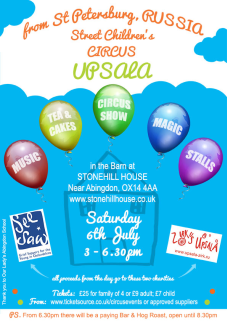Stephen Walsh (Stravinsky biographer)
AUTUMN PROGRAMME
Rosamund Bartlett continues her exploration of the lives of the Russian Tsars and the cultural and artistic developments which characterise their reigns:
Saturday 17th October: Russian Culture and Society in the Reign of Alexander III, 1881-1894
Time: 11:00 - 17:00
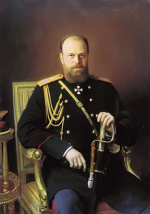 Alexander Alexandrovich Romanov never expected to become Tsar. The second son of Alexander II, who reigned from 1855, he spent the first twenty years of his life in the shadow of his elder brother Nikolay. But when the Tsarevich died unexpectedly in 1865, he was suddenly thrown into the limelight. The following year, by now the heir apparent, he married Princess Dagmar of Denmark, to whom his brother had been betrothed. In 1881, his father was assassinated by revolutionaries, and Alexander suddenly found himself Emperor of all Russia. Alexander III reacted by bringing the wheels of reform to an abrupt halt. Until his own unanticipated death in 1894 at the age of forty nine, he pursued a policy of extreme conservatism.
Alexander Alexandrovich Romanov never expected to become Tsar. The second son of Alexander II, who reigned from 1855, he spent the first twenty years of his life in the shadow of his elder brother Nikolay. But when the Tsarevich died unexpectedly in 1865, he was suddenly thrown into the limelight. The following year, by now the heir apparent, he married Princess Dagmar of Denmark, to whom his brother had been betrothed. In 1881, his father was assassinated by revolutionaries, and Alexander suddenly found himself Emperor of all Russia. Alexander III reacted by bringing the wheels of reform to an abrupt halt. Until his own unanticipated death in 1894 at the age of forty nine, he pursued a policy of extreme conservatism.
And yet this was the Tsar who finally liberated the Russian performing arts from the stranglehold of the Imperial Theatres, allowing for the emergence of Chaliapin, and enabling Chekhov to make his debut as a dramatist. And it was Alexander who spurned giving commissions to Western European artists in favour of supporting home-grown talent.
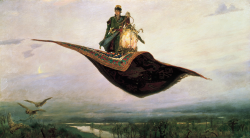 This day of lectures will explore the major developments in Russian culture and society during Alexander III's reign, beginning with the dazzling neo-Russian Church of the Saviour on the Spilt Blood. Built on the spot where Alexander II was assassinated in the middle of neo-classical St. Petersburg, its sumptuous mosaic interiors were some of Russia's leading artists. During his reign, Alexander also laid the foundations for the creation of the Russian Museum - the first national gallery of Russian art. Other topics to be discussed include the tradition of the annual Fabergé eggs inaugurated by Alexander III in 1885, and the Tsar's patronage of Tchaikovsky. This resulted in the commission of the ballets Sleeping Beauty and The Nutcracker, and the opera The Queen of Spades, as well as the highly successful Petersburg premiere of Eugene Onegin. It was during the reign of Alexander III that the Mariinsky Theatre truly began to enter its golden age. We will also follow Chekhov's unusual evolution from contributor to low-brow comic journals to celebrated author of stories and plays which flew in the face of convention.
This day of lectures will explore the major developments in Russian culture and society during Alexander III's reign, beginning with the dazzling neo-Russian Church of the Saviour on the Spilt Blood. Built on the spot where Alexander II was assassinated in the middle of neo-classical St. Petersburg, its sumptuous mosaic interiors were some of Russia's leading artists. During his reign, Alexander also laid the foundations for the creation of the Russian Museum - the first national gallery of Russian art. Other topics to be discussed include the tradition of the annual Fabergé eggs inaugurated by Alexander III in 1885, and the Tsar's patronage of Tchaikovsky. This resulted in the commission of the ballets Sleeping Beauty and The Nutcracker, and the opera The Queen of Spades, as well as the highly successful Petersburg premiere of Eugene Onegin. It was during the reign of Alexander III that the Mariinsky Theatre truly began to enter its golden age. We will also follow Chekhov's unusual evolution from contributor to low-brow comic journals to celebrated author of stories and plays which flew in the face of convention.
Saturday 14th November: Nicholas II (1894-1917) - details to follow
Time: 11:00 - 17:00
Tickets: £60 (including buffet lunch and afternoon tea). Overnight accommodation with dinner is also available.
Robert Fripp (musician)
Friend of The Great Britain-Russia Society
Day rate: £60, including refreshments and buffet lunch
Accommodation & Evening Meals
For those coming from farther afield, accommodation is available for one or two nights. All rooms are beautifully decorated, comfortably furnished and have their own bathroom. Overnight guests also have use of the pool, grounds and living rooms. Rooms cost £60/£85 for Single/Double occupancy on the Friday (breakfast only) or £75/£115 for Single/Double occupancy on the Saturday (dinner and breakfast included). Please see the Please see the Booking Form for details and the Gallery for images of the house and rooms.
To book, please use our Booking Form or call 07793 240 867 for more information.
Stonehill House is a comfortable and spacious family home with extensive grounds, in rural Oxfordshire. Within easy reach of Didcot Parkway and Oxford stations, Stonehill can accommodate up to 12 people in a variety of uniquely decorated, mostly double, bedrooms.
The house and grounds are home to an interesting collection of artworks by Andrew Logan, several with a Russian influence.
Our speakers:
Rodric Braithwaite was born in London and educated at Bedales and Cambridge where he studied French and Russian. He served as a sergeant in military intelligence in Vienna before joining the Diplomatic Service in 1955 and had postings in Jakarta, Warsaw, Moscow, Rome, Brussels (EU) and Washington. He was on the Sherpa team for the G7 Summits (1984-8), ambassador in Moscow (1988-1992), Foreign Policy Adviser to Prime Minister Major and Chairman of the Joint Intelligence Committee (1992-3). Since 1994, he has been among other things a Governor of the English National Opera, Chairman of the Royal Academy of Music, and Senior Adviser to Deutsche Bank. He was a Visiting Fellow at All Souls College, Oxford (1972-3) and at the Wilson Center in Washington (2005). He published "Across the Moscow River” (2002), about the collapse of the Soviet Union; “Moscow 1941: A City and its People at War” (2006), which appeared in eighteen languages; and “Afgantsy: The Russians in Afghanistan 1979-1989” (2011), which has been translated into Russian, Polish, Ukrainian and Japanese. “Coming of Age in Warsaw: A Cold War Story” was published privately in 2014. He is now working on a book about Russian and Western perceptions of the nuclear confrontation. He regularly speaks and writes on Russia and other matters.
Back to top of Page
Mike Nicholson is an Emeritus Fellow of University College Oxford. The bulk of his publications have been on unofficial Russian literature and especially the Gulag theme. His work on Aleksandr Solzhenitsyn ranges from the phenomenology of his reception in East and West to textological and bibliographical aspects of his work, and he has translated several of Solzhenitsyn's writings over the years. His current project is a study of Solzhenitsyn's writing in the 1940s and 1950s (provisional title: Solzhenitsyn's Road to 'Ivan Denisovich'). The other twentieth-century writer on whom he has published is Varlam Shalamov, author of Tales of Kolyma (Kolymskie rasskazy). He is an Honorary Professor of Henan University, China.
Back to top of Page
Rosamund Bartlett is a writer, scholar and translator who has lectured on Russian cultural history at universities, museums, and public institutions around the world. The author of several books, including Wagner and Russia, Chekhov: Scenes from a Life, and Tolstoy: A Russian Life, which was longlisted for the Samuel Johnson Prize, she has a particular interest in the intersection between politics, history and the arts. She has also received recognition as a translator, having published two volumes of Chekhov's stories and the first unexpurgated edition of his letters. Her new translation of Anna Karenina will be published by Oxford World's Classics in August 2014. She is a Trustee of the Anton Chekhov Foundation, set up to preserve the writer's house in Yalta, and in 2010 was awarded the Chekhov 150th Anniversary Medal by the Russian government in recognition of her educational and charitable work.
Back to top of Page
Stephen Walsh is an experienced and widely skilled musical scholar and biographer, exceptionally well placed to tell this story. He was for many years deputy music critic of The Observer and a frequent reviewer also for The Times and Financial Times and has broadcast regularly on musical topics for the BBC. He joined Cardiff University as a Senior Lecturer in Music in 1976, where he held a personal chair in the School. The first volume of his major biography of Stravinsky - Stravinsky: A Creative Spring - won the Royal Philharmonic Society Prize for the best music book published in the UK in the year 2000. Volume Two - Stravinsky: The Second Exile - was published in 2006. His latest book, Musorgsky and his Circle: A Russian Musical Adventure, was published in November 2013.
Back to top of Page
Christopher Danziger is a tutor in the Oxford University Department of Continuing Education. He teaches modern European history with a special interest in Napoleon and Imperial Russia. With a Russian grandmother and a father who was born a subject of Tsar Nicholas II, Russian history is in his blood. He has lectured on Russian history on several Oxford University programmes, at the University of Cape Town, at the Marlborough College Summer School, and Gilman College in Baltimore. He has led tours to the Crimea, Moscow and St Petersburg, and the Trans-Siberian Railway.
Back to top of Page
Previously At Stonehill House
2015 Season
Saturday 2nd May: Russian Culture and Society in the Age of Anna Karenina: The Reign of Alexander II, 1855-1881
Speaker: Dr Rosamund Bartlett
11:00 – 17:00
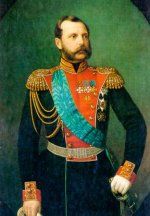
Following directly on from her lecture on the Tsar Nicholas I, Rosamund Bartlett returns to Stonehill House to explore the reign of his son, Alexander II. A character very different to his father, who had kept Russia ice-bound for thirty years, Alexander soon earned his nickname of “Tsar-Liberator” by abolishing serfdom in 1861. The optimism unleashed by these Great Reforms heralded an unprecedented creative energy among artists, musicians and writers. However, it also led to the re-emergence of the revolutionary movement, whose extreme wing soon resorted to terrorist tactics. Frustration with the pace of reform led to the Tsar’s assassination in 1881.
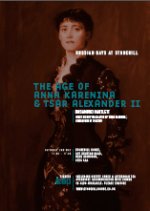 |
| Click to View PDF |
Saturday 18th April: Solzhenitsyn before and after Ivan Denisovich
Speaker: Dr Michael Nicholson
11:00 – 17:00
 A day exploring the life and work of Aleksandr Solzhenitsyn, variously labelled in his lifetime zek, much-admired author of A Day in the Life of Ivan Denisovich, gallant Soviet dissident and intractable exile in the West. Dr Nicholson, who knew the writer personally, looks at Solzhenitsyn’s orthodox Soviet beginnings, his brief official celebrity as a writer, sandwiched between eight years in the Gulag and twenty years' banishment by Stalin's successors, as well as his controversial return to post-Soviet Russia at the end of the century and his place in the canon of Russian literature.
A day exploring the life and work of Aleksandr Solzhenitsyn, variously labelled in his lifetime zek, much-admired author of A Day in the Life of Ivan Denisovich, gallant Soviet dissident and intractable exile in the West. Dr Nicholson, who knew the writer personally, looks at Solzhenitsyn’s orthodox Soviet beginnings, his brief official celebrity as a writer, sandwiched between eight years in the Gulag and twenty years' banishment by Stalin's successors, as well as his controversial return to post-Soviet Russia at the end of the century and his place in the canon of Russian literature. 2014 Season
Saturday 6th December: Russian Culture and Society in the Reign of Nicholas I, Emperor of All The Russias, 1825-1855
Speaker: Rosamund Bartlett
11:00 – 17:00
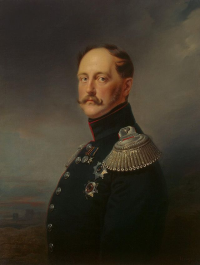 To those who encountered him, Nicholas I seeemed the very
personification of Russian autocracy. Over six foot tall, handsome, blue-eyed,
with a majestic bearing, and the voice of one born to command - even
implacable enemies were awestruck in the Tsar’s presence.
Ladies-in-waiting might have swooned, but this regal composure masked a
paranoid and violent streak.
To those who encountered him, Nicholas I seeemed the very
personification of Russian autocracy. Over six foot tall, handsome, blue-eyed,
with a majestic bearing, and the voice of one born to command - even
implacable enemies were awestruck in the Tsar’s presence.
Ladies-in-waiting might have swooned, but this regal composure masked a
paranoid and violent streak. Nicholas I did not expect to become Tsar when Alexander I suddenly died in 1825. In the interregnum before his elder brother renounced the throne, a group of liberal-minded officers staged a badly managed mutiny. Nicholas I dealt brutally with the leaders of the Decembrist Uprising, and for the thirty years of his reign ruled Russia with an iron fist. Petrified by the thought of further subversive activity and determined to crush it, he achieved notoriety as the ‘Gendarme of Europe’. Under his reactionary rule Russia stagnated, with dire consequences when it came to the Crimean War.
And yet this was an extraordinarily rich time from the point of view of Russian culture. During the reign of Nicholas I, Pushkin published some of his best-known work and Turgenev, Dostoevsky and Tolstoy all made their literary debuts. Glinka laid the cornerstone of Russian opera with "A Life for the Tsar", and Bryullov’s paintings achieved international renown. Nicholas himself built the neo-Byzantine Grand Kremlin Palace and commissioned the six volume Antiquities of the Russian State. He also established the lavishly funded Imperial Italian Opera in St. Petersburg, and opened the first public galleries of the Hermitage.
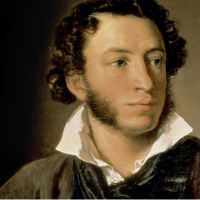 |
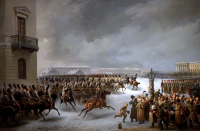 |
| Alexander Pushkin | The Decembrist Uprising |
Rosamund Bartlett returns to Stonehill with a day of illustrated lectures exploring the many dimensions of Nicholas I’s long and complex reign.
Saturday 15th November: The Russian Icon
Speaker: Sir Richard Temple
11:00 – 17:00
Saturday 25th October: Crimea
Speaker: Neal Ascherson
11:00 – 17:00
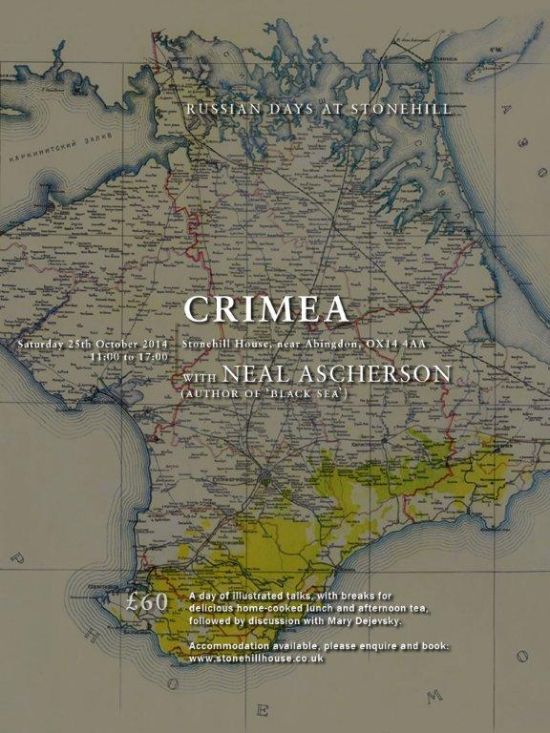
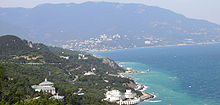 The Crimean Peninsula, almost entirely encircled by the Black Sea and the Sea of Azov, straddles a strategic boundary between the western and eastern worlds, between "civilisation" and "barbarism". Neal Ascherson's illustrated talks will travel though its
The Crimean Peninsula, almost entirely encircled by the Black Sea and the Sea of Azov, straddles a strategic boundary between the western and eastern worlds, between "civilisation" and "barbarism". Neal Ascherson's illustrated talks will travel though its 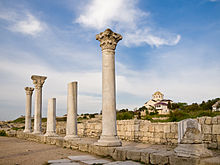 spectacular history, from colonization by Greeks, Romans and Ottomans, the arrival of Christianity and the Black Death, and the changing cast of eastern colonizers, including the Tatars, the Khanate and Russia. From there we look at the Crimean War, the growth of the wine industry, the transformation of the Black Sea coast into a Soviet tourist destination and the fate of the Tatars under Stalin before arriving at Crimea today.
spectacular history, from colonization by Greeks, Romans and Ottomans, the arrival of Christianity and the Black Death, and the changing cast of eastern colonizers, including the Tatars, the Khanate and Russia. From there we look at the Crimean War, the growth of the wine industry, the transformation of the Black Sea coast into a Soviet tourist destination and the fate of the Tatars under Stalin before arriving at Crimea today.Mary Dejevsky – a modern perspective on Crimea
We are delighted to announce that journalist, broadcaster and respected Russian expert, Mary Dejevsky, will be completing our look at Crimea with a summary of the situation there today and the background to recent events.
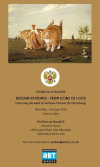
We are pleased to announce a unique exhibition to be held in The Barn at Stonehill.
'Russian Extremes-from Icons to I-cats'.
This is a collection of work by two Russian artists:
Images of six contemporary icons by Archmandrite Zenon painted for the Feodorovsky Cathedral in St Petersburg will be displayed alongside Svetlana Petrova's I-cats.
The I-cats are images taken from The Russian Museum in St Petersburg integrated with images of Zarathustra, the cat.
The exhibition runs from 11am to 5pm daily. Free Entrance.
Further images of I-cats are available from: http://fatcatart.gallery
Saturday 5th April: The Shot that Changed the World – how the assassination of Archduke Franz Ferdinand led to the end of the Romanovs and the birth of the Bolsheviks
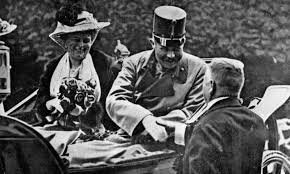 |
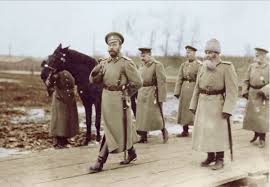 |
Speaker: Christopher Danziger
11:00 – 17:30
The First World War took nobody by surprise, so how did Russia become embroiled in a war for which she was so inadequately prepared? Tsar Nicholas and his ministers effectively signed their own death warrants with their unrealistic foreign policies, diplomatic blunders and incompetent conduct of the war. Russia was made to pay an enormous price for her enforced withdrawal from the conflict but her miseries were by no means over. The end of the First World War merely ushered in three years of a terrible, destructive Civil War from which a splinter party emerged triumphant - to rule Russia for almost a century.
Christopher Danziger will talk us first through pre-war thinking and international relations in Russia and the series of flawed and fatal decisions which led to the overthrow of the Romanov dynasty. In the second half of the day, we look at the aftermath of the Tsar's abdication and how it took three years of brutal civil war before Lenin and the Bolsheviks were established as his successors.
The Russian Five: Musorgsky and the Balakirev Circle - one of the most intriguing and colourful stories in musical history.
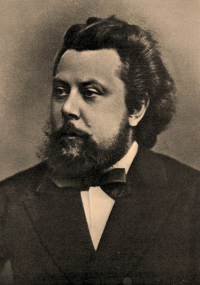
Speaker: Stephen Walsh
The emergence of Russian classical music in the nineteenth century comprises one of the most remarkable and fascinating stories in all musical history. The five men who came together in St. Petersburg in the 1860s, all composers of talent, some of genius, would be—in spite of a virtual lack of technical training—responsible for some of the greatest and best-loved music ever written. Known in the West as the Five, and in Russia as moguchaya kuchka - the Mighty Little Heap - these friends, competitors, and creative intellectuals, Mily Balakirev, César Cui, Alexander Borodin, Nikolay Rimsky-Korsakov and, most importantly, Modest Musorgsky, are brought to life in Stephen Walsh's illustrated lecture.
Exploring the Arts in Russia
A series of informal talks on Russian literature, music and film.

Creative Writing with Anne Aylor
2013 Season
MYSTICISM in early Soviet Russia
Speaker: Sergey Moskalev (author and editor of 'Science & Religion' magazine, Moscow)
Soviet Russia is viewed as a time of spiritual sterility, repression and an enforced atheism. But the country's rich and ancient spiritual heritage, while suppressed under communist rule, could not be entirely eradicated from the Russian psyche. The beginning of the 20th century in Russia, scene of war and Bolshevik activities, was also a time of growing interest in mysticism and esoteric phenomena.
Sergey Moskalev, author and editor of Moscow-based magazine, Science & Religion, takes us through the early Soviet era and traces the profound spirituality underpinning much Soviet art.
We begin with Tolstoy, a devoutly religious man who early on embraced pacifism, the immorality of property-ownership and vegetarianism. Still revered as the greatest Russian author of all time, he was held up by the emerging Communist movement as a hero of their principles and was lauded by the Bolsheviks after his death as a forerunner of socialism.
We then move on to look at spiritualism in other art forms, including Scriabin's Mysterium, Roerich's commitment to spiritual values and occult mysticism, Peter Ouspensky and the concept of eternal return, Dr Azarov and the origin of Zoizm and Mikhail Bulgakov's The Master & Margarita. The talk also embraces the concept of the noosphere (the effect of human cognition on Earth's evolution) developed by Vladimir Vernadsky in the 1900s , before we take a brief look at Barchenko and the Soviet Government's research on telepathy and telekinesis in the late 1920s.
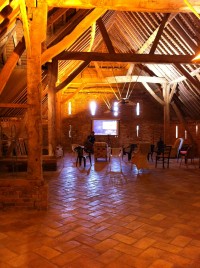 |
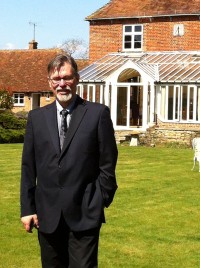 |
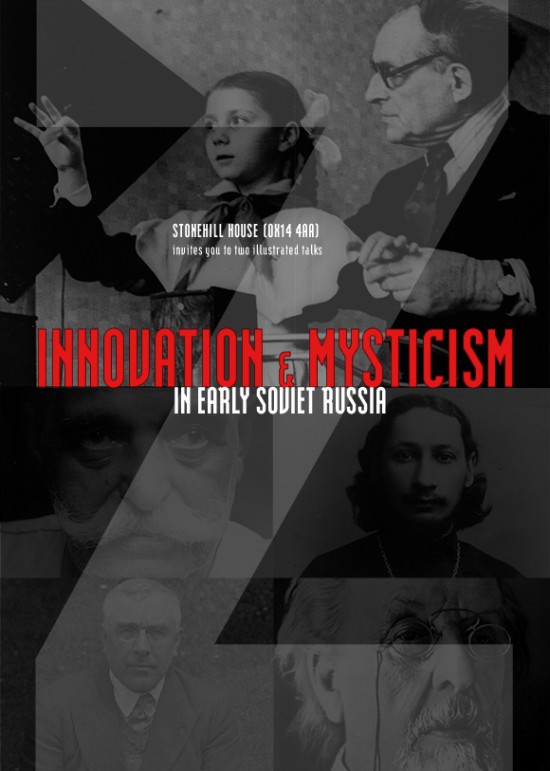 |
| Getting the barn ready | Sergey Moskalev at Stonehill | Mysticism in early Soviet Russia |
LEON THEREMIN and the invention of electronic music in early Soviet Russia.
The hectic period of the 1910-30s was a time of complex and inconsistent social and political movements which define an epoch filled with revolutions, wars and totalitarian dictatorship. Despite the circumstances, early Soviet culture accumulated unprecedented levels of creative energy which led to amazing innovations at the beginning of the 20th Century. Living in famine, extreme cold and poverty, creative people were nonetheless dreaming about a future country where everything would be different: the perfect man, a universal language, real machines……Artists, poets, musicians and architects rushed enthusiastically into the new reality, studying physics and mathematics, embracing the scientific exploration of the nature of light and sound and developing theories about what became known as 'the Art of the Future'…….While the history of Russian post-revolutionary avant-garde art and music is fairly well documented, the inventions and discoveries, the researchers of sound, creators of musical machines and founders of new musical technologies have largely been forgotten, with the exception of Leon Theremin, inventor of the theremin-vox (1919).
As a physicist, musician and engineer Leon Theremin worked on innumerable projects at the cross roads of creative technology. His life story is a fascinating one, not least for his secret work for the NKVD (KGB). He realised the possibility of producing pitched sound while fixing a radio station during the Civil War. The theremin-vox (originally called an etherphone) consists of two metal antennae which sense the position of the player's hands and control oscillators for frequency with one hand, and amplitude with the other, so it can be played without being touched. After visiting America in the 1920s and patenting the instrument with RCA, Leon Theremin returned to Soviet Russia only to be banished to the Kolyma Prison camp in Siberia for several years by Stalin. Leon Theremin nevertheless lived to be 97, spending the rest of his life in Soviet Russia.
Robert Moog in America started his career by building theremins in the 1950s.
Talks by Andrey Smirnov (founder of the Theremin Centre in Moscow)
Followed by Demonstration & Performance of Theremin-Vox by Lydia Kavina (see photograph as a child with Leon Theremin at top of this page'), accompanied on piano by Elena Kiseleva (works by Prokofiev and Rachmaninov)
OTHER TALKS
Russia in 1913 was poised on the brink of change, witnessing both growing political unrest and a vibrant flourishing of the arts. A dazzling list of composers, painters, dancers and poets - Stravinsky, Diaghilev, Rachmaninov, Pavlova, Chekhov, Kandinsky, Stanislavsky - was begining to emerge. In the centenary of this extraordinary year, pivotal in the history of Russia and its last year of peace before the dark clouds of war and revolution descended, Rosamund Bartlett returns to Stonehill House with a series of talks.
Kandinsky and the Russian North
Modernist Moscow, Art Nouveau and Scriabin
Diaghilev's 'World of Art': Modernist St Petersburg: the Bohemians
'The Rite of Spring' and 'Victory Over the Sun'
2012 Season
Film-maker, Andrei Tarkovsky - his spiritual journey, including a screening of "Mirror"
Speakers: Mark Le Fanu (more info)
Writer, journalist and lecturer on film, Mark le Fanu explores some of the facets of Tarkovsky's artistic enterprise: his sense of history, his celebration of family, his struggles with faith, his patriotism and his lyrical openness to the beauty of the world. (more info)
Stravinsky & Diaghilev
Speaker: Rosamund Bartlett (more info)
Born in 1882 near St Petersburg, Igor Stravinsky died an émigré in 1971, his productive and often turbulent life spanning the key Russian events of the last century. His masterworks such as The Firebird and The Rite of Spring fixed his reputation as a leading composer.
After Tchaikovsky had made it into a serious genre in its own right, Russian ballet was at its prime, with Nijinsky and Pavlova amongst its greatest stars. In 1910 began Diaghilev's famous collaboration with Stravinsky, the enfant terrible of 20th-century music. After The Firebird came Petrushka, and then in 1913 the Parisian haute monde was shocked to its core by the epoch-making The Rite of Spring, one of the key works which catapulted Russian artists and musicians into the forefront of the European avant-garde.
Boris Pasternak - a glimpse into family correspondence
Speaker: Nicholas Pasternak Slater (more info)
"Boris Pasternak's nephew, Nicolas, is our host for the day. Serene and eloquent, wise and welcoming, he leads us through the compelling story of his family....." read full review
"Nicolas Pasternak Slater grew up in a household where his absent uncle was a constant presence, a figure he felt he knew intimately despite never directly communicating with him." (read full article)
Chekhov & Tolstoy - their lives and their prose
Speaker: Rosamund Bartlett (more info)
Author and translator Rosamund Bartlett discusses the lives of two very different writers who had an abiding affection for each other. Her illustrated talks provide a political and cultural background to these literary colossi.
"Such a hugely enjoyable day on Tolstoy and Chekhov. A combination of input by an authoritative and engaging lecturer, Dr Rosemary Bartlett with a historic and beautiful setting. And a gifted chef! Thank you." - Anne Dodd
20th Century Russian Poetry in an age of repression
Speaker: Robert Chandler & Masha Karp (more info)
Translators Chandler and Karp read a selection of poetry, some in translation, some in the original by Russian poets Fet, Ahkmatova, Tsevetaeva, Mandlestam and others. Together they discussed the lives of creative people living under Stalinism.
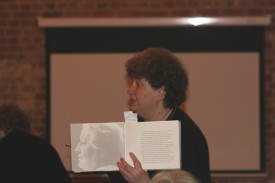 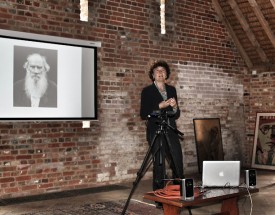 |
MORE ABOUT OUR SPEAKERS
- Mark Le Fanu
Anyone interested in attending this Tarkovsky day who might like to read a little more about the director in advance, is encouraged to visit the excellent Tarkovsky website www.nostalghia.com. Mark Le Fanu's book "The Cinema of Andrei Tarkovsky" (British Film Institute, 1987, second edition 1990) is unfortunately out of print, though perhaps available in good libraries. A sound current short introduction to Tarkovsky's films is by Sean Martin ("Andrei Tarkovsky", Kamera Books, second edition 2011). In addition, all seven of Tarkovsky's films are currently available on DVD, either individually or in a DVD box set. (more info)
Back to top of Page
- Nicolas Pasternak Slater
Nicolas Slater is the son of Boris Pasternak's sister Lydia. He has divided much of his life between working as a medical specialist in haematology and as a translator, publishing both scientific and literary translations, including Boris Pasternak's autobiographical essay People and Propositions and more recently the poet's correspondence with his family. He has also translated works by Lermontov and Pushkin, which will be published in the near future. The weekend includes a rare opportunity to visit the Pasternak Museum in Oxford.
Back to top of Page
- Rosamund Bartlett
Rosamund Bartlett works as a writer, translator and lecturer, and specialises in Russian and European cultural history. Her latest book, Tolstoy: A Russian Life (Profile, 2010), was published last November to mark the centenary of Tolstoy's death, and was longlisted for the Samuel Johnson Prize. Her previous books include Wagner and Russia (Cambridge UP), Chekhov: Scenes from a Life (Free Press), Literary Russia: A Guide (co-authored with Anna Benn), and the edited volume Shostakovich in Context (Oxford UP, 2000). Rosamund also recently completed a new translation of "Anna Karenina."
Back to top of Page
- Robert Chandler and Masha Karp
Robert Chandler has published poems in the TLS and other journals. His translations of Sappho and Apollinaire are published in the series "Everyman's Poetry", and his translations of Vasily Grossman and Andrey Platonov have won prizes both in the UK and the USA. His "Russian short stories from Pushkin to Buida" is published by Penguin Classics. This December, Penguin Classics will be publishing his anthology of Russian folk tales, and in 2014 they will publish the anthology of Russian poetry in translation that he is working on now.
Masha Karp is a translator of English and German poetry and prose into Russian and has published translations of many writers, including Virginia Woolf, George Orwell, Dylan Thomas and W.H. Auden. She is a member of the St Petersburg Writers' Union and the Literary Translators Guild in Russia. As Chair of the Pushkin Club in London, Masha runs regular Translators' evenings, for the discussion of translations of Russian poetry and prose.
Back to top of Page
St Petersburg Children's Circus
Anne Aylor's Creative Writing Courses presents
- From Chekhov to Carver
17 - 19 May 2013 @ Stonehill House, near Abingdon, Oxfordshire, UK
Click here for more information and booking form. Review of Anne Aylor's Creative Writing Courses:
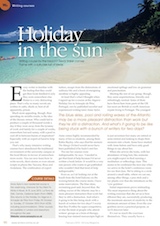
Back to top of Page
